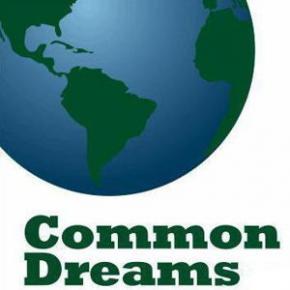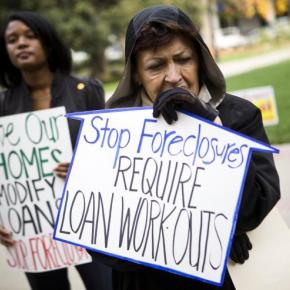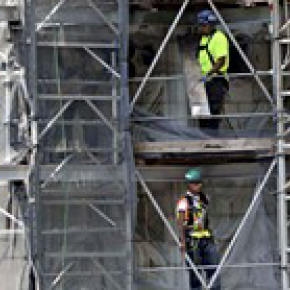America Has Become A Tyranny of the Few - But We Can Fight It
America Has Become A Tyranny of the Few - But We Can Fight It
We’re in the thick of the second post-Citizens United presidential campaign, and it’s already clear that allowing unlimited funds to influence political elections was a terrible idea. ...
We’re in the thick of the second post-Citizens United presidential campaign, and it’s already clear that allowing unlimited funds to influence political elections was a terrible idea.
Half of the funds supporting presidential candidates from both parties comes from a mere 158 families — a miniscule percentage of America’s 120 million households — as documented by a recent New York Times investigation. Largely white, older, male, and Republican, they are also unrepresentative of what our multicultural society looks like.
As a result of this narrow group of donors controlling what’s on the political agenda, America has a fundamentally undemocratic system in which working class people and people of color are left on the margins, silenced in a political debate, they can’t gain access to — because they don’t have millions to share.
America has become a tyranny of the few, and Americans are fed up with the broken system. Last week, voters in Maine elected to increase funding from $2 million to $3 million for the Clean Elections Fund, which provides government grants to candidates who agree to limit their spending and private fundraising. It might be a long time before Citizens United is overturned. In the interim, it’s important that other states introduce similar legislation challenging existing financing models.
The tyranny of the few is two-pronged, however. Not only are our elected leaders being held accountable to wealthy donors instead of the people of our nation, the least privileged of this nation are simultaneously facing strong barriers to voting.
Our antiquated voter registration system results in roughly 62 million eligible voters not registered, either because they never registered or their registration information is incorrect. In a 2008 Current Population Survey, blacks and Latinos cited “difficulties with the registration process” as their main reason for not registering to vote. Whites disproportionately reported not registering because they were “not interested in elections or politics.” Barriers to voting registration are in many states especially well in place for people of color, workers and youth, who are targeted by voter suppression laws.
We could put an end to the error-ridden old-fashioned manual voter registration and step into the 21st century with automatic voter registration. Other states could follow the example set by California and Oregon, which are linking voter registration to the Department of Motor Vehicles. Through linking voter registration with public offices such as the DMV, revenue agencies, the Postal Service and others, the United States could secure over 56 million more voters, as a report from Center for Popular Democracy shows.
So to sum up: people of color and working class Americans aren’t just unable to place millions of dollars with politicians who will take care of them in Congress, they aren’t even able to vote for leaders who might serve their interests.
The outcome? Our America has become an oligarchy run by a tiny and overly privileged section of its population, whose lives and wishes for our nation are in stark opposition to the lives and dreams of the average American.
This is borne out in our legislation. Despite overwhelming public support for policies such as taxing those who earn more than $1 million a year, and laws that address inequality, workers’ rights, and protection of the middle class, we see the footprints of corporate powers all over our legislation.
We need to act fast by passing laws that disrupt this undemocratic cycle. We must break Congress’ dependency on big money and return the power to the people, but we can’t only rely on our lawmakers to change our nation.
It will take a lot of work, but we can’t allow for this undemocratic oligarchy to go on. Let’s not leave the future of our country in the hands of the wealthiest, let’s instead bring back democracy to our nation.
Source: Common Dreams
Escuelas Chárter: Encuesta Cuestiona su Función y Pone la Lupa en sus Finanzas
Miami Diario - March 4, 2015 by Donatella Ungredda - Existe una preocupación creciente entre padres, representantes, maestros y contribuyentes a nivel regional y nacional con relación al...
Miami Diario - March 4, 2015 by Donatella Ungredda - Existe una preocupación creciente entre padres, representantes, maestros y contribuyentes a nivel regional y nacional con relación al rendimiento y cumplimiento de los objetivos educativos establecidos para las escuelas chárter. Las escuelas chárter son una forma más libre de educación pública o privada. Usualmente son fundadas por padres o maestros, manejadas por organizaciones con y sin fines de lucro; funcionan independientemente del sistema de educación pública y hacen hincapié en métodos y aéreas educativas más específicas. Normalmente atienden a un universo mucho más variado de alumnos y deben cubrir los requerimientos de educación especial de los mismos. El tamaño de las clases es más pequeño y en general se espera que tengan un nivel de rendimiento superior al promedio ya que, en teoría, al ser más libres de ensayar nuevas metodologías los alumnos encuentran más oportunidades para explotar sus capacidades. Estas instituciones conviven con las escuelas públicas que están sometidas a los estándares y regulaciones del Departamento de Educación y se mantienen con fondos públicos así como recolección de fondos privados. El crecimiento del número de escuelas chárter a nivel nacional se ha duplicado tres veces desde su implementación en el año 2000, según Donald Cohen, Director Ejecutivo de la organización no gubernamental In The Public Interest (ITPI). Cohen, junto a Kyle Serrette del Centro para la Democracia Popular (Center for Popular Democracy, CPD), revelaron los resultados de una reciente encuesta realizada entre un universo de 1000 votantes: la gran mayoría apoya la existencia de las escuelas chárter, pero asimismo exige una más exhaustiva supervisión del funcionamiento de estas instituciones, así como la realización de auditorías en sus finanzas, dados los pobres resultados académicos y la falta de transparencia en su administración. "Las escuelas chárter han estado presentes desde hace 20 años, y su funcionamiento se implementó para servir de ejemplo, marco referencial para la reforma del sistema educativo estadounidense. Nuestras investigaciones nos han revelado que 75% de las escuelas chárter han tenido un rendimiento igual o peor que las escuelas públicas para las cuales se supone debían servir como modelo de reforma. Este es un síntoma de falta de supervisión de parte de los responsables", afirmó Serrette "Lo que estamos tratando de lograr es poner un alto al crecimiento momentáneamente y asegurarnos que estamos obteniendo unos resultados educativos idóneos. Recordemos que estas escuelas se financian con fondos públicos y tomando en cuenta las dificultades que enfrenta la nación, debemos hacer una pausa y asegurarnos que tenemos una serie de medidas legales robustas para la protección de los alumnos, maestros y contribuyentes", agregó Cohen. ITPI y CPD consultaron a los encuestados acerca de una serie de 11 propuestas para la mejor supervisión de las escuelas chárter y su administración y en base a los resultados obtenidos dieron a conocer su Agenda de Responsabilidad de las Escuelas Chárter. Las 11 propuestas son abarcadas por 4 puntos principales: · Transparencia y responsabilidad, · Protección a las escuelas del vecindario, · Protección de los fondos aportados por los contribuyentes, · Educación de alta calidad para cada alumno.
Source
Sexual Assault Survivors Personally Confront Senator Jeff Flake, Who Said He'll Vote Yes for Kavanuagh

Sexual Assault Survivors Personally Confront Senator Jeff Flake, Who Said He'll Vote Yes for Kavanuagh
Sexual assault survivors personally confronted Senator Jeff Flake after he said he'd vote to confirm Supreme Court nominee Brett Kavanaugh this morning. Flake, who is a republican from Arizona and...
Sexual assault survivors personally confronted Senator Jeff Flake after he said he'd vote to confirm Supreme Court nominee Brett Kavanaugh this morning. Flake, who is a republican from Arizona and considered a key swing vote, made his announcement less than 24 hours after both Dr. Christine Blasey Ford and Kavanaugh testified on her allegations that the Supreme Court nominee sexually assaulted her in high school.
Read the full article and watch the video here.
Police lay out security approach for People's March in wake of Dallas shootings

Police lay out security approach for People's March in wake of Dallas shootings
A scheduled protest march by a host of progressive advocacy groups as part of the Still We Rise convention downtown came with an added dose of tension and scrutiny a day after a protest in Dallas...
A scheduled protest march by a host of progressive advocacy groups as part of the Still We Rise convention downtown came with an added dose of tension and scrutiny a day after a protest in Dallas culminated in the shooting of five police officers.
The “People’s March” scheduled for 2:30 p.m. on Friday is part of the opening festivities for Still We Rise, a convention organized by the Center for Popular Democracy that’s brought 1,500 people to the city to gather over various causes such as workers' rights, climate change, criminal justice reform and many others.
They’re causes that overlap with the protest march in Dallas over recent police shootings in Minnesota and New Orleans. At that march Thursday, snipers targeted police officers, killing five and wounding seven others, according to various reports.
The People’s March is expected to protest against UPMC, Bank of New York Mellon and Republican Sen. Pat Toomey in a parade that will trail from the David L. Convention Center hosting Still We Rise to the U.S. Steel Tower, headquarters for UPMC, then to One Oxford Centre and across the Smithfield Street Bridge to the Pittsburgh office of Pat Toomey.
A spokesman or BNYMellon declined comment on the event. A representative for UPMC did not return a call seeking comment.
A statement by the Pittsburgh Bureau of Police laid out the public safety strategy and acknowledged calling on law enforcement resources beyond Pittsburgh.
“The Pittsburgh Bureau of Police is committed to keeping people safe during this afternoon’s planned People’s Convention March that begins at the David L. Lawrence Convention Center. There will be a visible presence of uniformed officers along with a not-so-visible presence of plain clothes officers,” reads the statement, quoting the event organizers’ intention of protesting growing inequality and “a toxic atmosphere of hate.”
“Officers will exercise extreme caution to ensure the safety of both our officers and the public,” continued the statement. “The Public Safety Department has been and will continue to be in communication with the FBI. The Police Bureau will work closely with law enforcement agencies on the federal, state and local levels.”
The event otherwise marked a modest convention event for the city, in which the 1,500 attendees represent 2,587 room nights at downtown hotels such as the Omni William Penn, the Wyndham Grand Pittsburgh Downtown, the Westin Convention Center and others.
The Still We Rise proceedings come on the same weekend that the city of Pittsburgh is celebrating the 200th anniversary of its incorporation as a city, including a Bicentennial Parade scheduled for Saturday morning at 11:00 a.m., just one of what’s expected to be more than 100 affiliated events throughout the city in the coming weeks.
Yet the city’s celebration of its birthday has been overshadowed by the shootings in Dallas and by the police shootings of black men in Louisiana and Minnesota that helped to trigger them.
Anticipating the anger and sadness from the shootings, on Friday Pittsburgh Mayor Bill Peduto, working with Allegheny County Chief Executive Rich Fitzgerald, called for “communitywide peace summit” to be held sometime next week.
“We are all affected by the violence in our communities – whether it be here in Pittsburgh, in Dallas, or so many other cities – and we all must do everything we can to stop it,” he said in a prepared statement. “Pittsburgh is a strong and resilient place, and our bonds are even stronger when all of us in the city work together.”
Peduto announced the plan for the summit without a determined date at a meeting today of Local Progress, a national network of progressive elected officials and other organization leaders from throughout the country.
By Tim Schooley
Source
Congress to Consider Bill to Help Part-Timers
New York Post - July 22, 2014, by James Covert - Part-timers with increasingly unpredictable work schedules are taking their beef to Washington.
A congressional bill is slated for...
New York Post - July 22, 2014, by James Covert - Part-timers with increasingly unpredictable work schedules are taking their beef to Washington.
A congressional bill is slated for introduction Tuesday that would give workers more control over their hourly schedules at big retailers like Walmart, Home Depot and JCPenney.
Led by Walmart, major chains increasingly are switching around workers’ shifts on short notice, making it difficult and often impossible for part-timers to work second jobs.
The practice — common in retail, restaurant, janitorial and housekeeping jobs — has hit working mothers especially hard, according to critics.
Unpredictable work hours make it difficult to schedule everything from babysitters to doctor’s appointments.
“I think it’s gotten to a crisis point,” said Carrie Gleason, director of the Fair Workweek Initiative, a new campaign by the Center for Popular Democracy, adding workers need “some amount of predictability and stability in our work hours so we can live and manage our lives.”
The bill, sponsored by US Reps. George Miller (D-Calif.) and Rosa DeLauro (D-Conn.), would require employers to give an extra hour of pay to workers summoned less than 24 hours in advance.
The bill would also guarantee a minimum of four hours’ pay if an employee is sent home early — a frequent occurrence at restaurants.
Source
Two Cook County commissioners proposing county I.D. card

Two Cook County commissioners proposing county I.D. card
A few weeks after the City Council approved the creation of a new municipal identification card, two Cook County commissioners on Wednesday introduced plans for a similar card in the county.
...A few weeks after the City Council approved the creation of a new municipal identification card, two Cook County commissioners on Wednesday introduced plans for a similar card in the county.
And like the city’s program, the Cook County version is aimed, in part, at people who are living in the county illegally.
Read the full article here.
US Federal Reserve Interest Rate: Philadelphia Activists To Protest New President Patrick Harker, Demand Meetings
Activists who are against a Federal Reserve interest-rate increase planned Tuesday to stage a protest outside the Federal Reserve Bank of Philadelphia. The demonstration was expected to target the...
Activists who are against a Federal Reserve interest-rate increase planned Tuesday to stage a protest outside the Federal Reserve Bank of Philadelphia. The demonstration was expected to target the bank’s new president, Patrick Harker, as part of the “Fed Up” campaign, a national coalition of families and community leaders calling on the Fed to adopt pro-worker policies.
The activists expected anywhere from 15 to 20 people, including workers, small-business owners and clergy, at the demonstration, aimed at pressuring Harker to take a tour of Philadelphia’s low-income neighborhoods, Politico reported. Although Harker this summer informally agreed to meet with the coalition, the Federal Reserve Bank of Philadelphia has backed out of that commitment, activists said.
Kendra Brooks, a leader of Philadelphia’s Fed Up coalition, said she has been urging Harker to meet with more than just the heads of nonprofits and corporations, Politico reported. She tried to get a commitment from Harker at the Fed's symposium in Jackson Hole, Wyoming, in August, and posted video of their encounter on YouTube.
Raising the interest rate would have a tremendous impact on African-American workers, economists have said. Low rates have allowed the economy to inch closer to a full recovery and to full employment, which has benefited blacks more than others. However, blacks still have the widest unemployment rate gap to close with whites.
The African-American unemployment rate was 9.2 percent in September, more than double the 4.4 percent rate for whites. Black Americans make up about 13 percent of the country’s 318 million residents and have seen stagnant wages and declines in wealth, as the U.S. economy recovered from the recession of 2007-09, the worst economic downturn since the Great Depression.
“The Federal Reserve is the most important decision-maker when it comes to whether we’ll get to full employment in the next two to three years,” said Valerie Wilson, director of the Program on Race, Ethnicity and the Economy at the Economic Policy Center in Washington, D.C. Wilson released a reportin March on the racial impacts of a federal interest-rate hike.
“The timing of the Fed’s decision to raise interest rates will influence how low the unemployment rate gets, how quickly wages grow, and how much African-Americans will share in our country’s prosperity,” Wilson said. “For the sake of American workers, the Fed should not raise interest rates until we are much closer to full recovery and full employment.”
Source: IBTimes
S&P 500, Nasdaq end at records after Fed speech
Several protesters from the progressive group Fed Up stood outside the conference room where Powell delivered the speech.
...
Several protesters from the progressive group Fed Up stood outside the conference room where Powell delivered the speech.
Read the full article here.
Scaffold Law Debate Heats Up Over Dueling Reports on Safety and Costs
Legislative Gazetter - April 21, 2014, by Matthew Dondiego - A new report released last Thursday by a pro-labor, pro-immigrant rights advocacy group criticizes the construction industry for using...
Legislative Gazetter - April 21, 2014, by Matthew Dondiego - A new report released last Thursday by a pro-labor, pro-immigrant rights advocacy group criticizes the construction industry for using what they call misleading figures and cherry picking data to lobby against the state's controversial "scaffold law."
The scaffold law is a century-old law in place to protect worker's rights. Under the law, contractors and property owners serving as contractors are responsible for providing a safe work environment for their employees or become liable for any on-site injuries and accidents.
Opponents of the law point out that contractors are fully liable for workers' injuries even if it is determined the worker is at fault. Opponents say it is outdated and causes construction costs to rise due to the increased costs of insurance premiums. Supporters of the law say it provides common sense protection for workers performing a dangerous job and maintain that contractors are not held liable in court if proper safety precautions are in place.
The new report, titled Fatally Flawed and released by the Center for Popular Democracy, which is supported financially by the New York State Trial Lawyers Association and labor unions, is a scathing criticism of a Rockefeller Institute study — which is frequently referenced by the construction industry — that concluded the scaffold law resulted in an additional 667 work site injuries and adds about $3 billion in additional costs to construction projects in New York state each year.
According to last week's report, the oft-cited Rockefeller Institute study is "fundamentally biased" and calls the New York Civil Justice Institute, which paid $82,800 to commission the Rockefeller study, "a poorly-disguised front group" for the construction industry aligned Lawsuit Reform Alliance of New York. According to the report, the Lawsuit Reform Alliance of New York and the New York Civil Justice Institute share the same address, 19 Dove St, Suite 201, Albany, N.Y., and the same telephone and fax numbers.
"This [Rockefeller Institute] study was bought and paid for by the construction industry," Josie Duffy, a staff attorney for the Center for Popular Democracy. "This is a direct result of people who do not like the scaffold law for business reasons, paying for this report to be released."
On the claim that the scaffold law contributed an additional 667 injuries, the report says the Rockefeller Institute "confuses correlation with causation."
This claim, according the Center for Popular Democracy, is based on worker injury rates in "sub-sectors and non-construction industries," such as warehouse work, transportation, roofing, residential building construction, manufacturing, wholesale trade and utilities industries, and are compared to the rest of the nation.
"The authors assert that these differences are greater in New York and attribute these greater differences entirely to the scaffold law," the new report reads. "There is simply no basis to conclude that the scaffold law is the cause of these differences. Indeed, the authors provide no justification for comparing injury rates in construction with injury rates in less hazardous industries, or using those differences as a proxy for the impact of the scaffold law."
Duffy bluntly says that the scaffold law does not cause an increase in workplace accidents. She says the Rockefeller Institute's study, which was released in February, lacks factual evidence that the law makes work sites more dangerous and "that number is coming from nowhere."
"To me, that is the most egregious part of this whole report," Duffy said.
Despite the strong words used in the report and by Duffy, Tom Stebbins, executive director of the Lawsuit Reform Alliance of New York, says that the Rockefeller report "conclusively" found the law made construction sites more dangerous for workers.
He said that absolute liability for contractors creates "perverse incentives" for workers.
"Workers are not incentivized because they are never held responsible and contractors are not incentivized because they are guilty in nearly every circumstance," Stebbins said. "Only by apportioning liability to fault, as is done in every other state and every other part of our civil justice system, can we maintain balance and improve safety."
According to Stebbins, the report released by the Center for Popular Democracy last week is a "political hit piece, with no statistical merit or actual research of any kind. They cannot get researchers to back up their opinions, because the facts do not support the scaffold law."
Stebbins argues that absolute liability causes the insurance markets to treat sites with sterling safety records the same as companies with less stringent safety precautions. Opponents of the scaffold law say that absolute liability holds the company liable for the worker injuries regardless of who is actually found to be at fault.
Duffy however, said that companies are not automatically found to be liable for injuries sustained by workers on construction sites and are typically safe from injury-related costs so long as they had the proper safety precautions in place.
"What absolute liability means is that you have to pay for the costs of the injuries … and that's only going to happen if you're breaking the law," she explained. "What this law says is there has to be some level of protection for workers."
According to Duffy, under the law companies still hold the right to argue their case in court and they are not automatically found responsible for every injury.
"It's important that employers get to have their voices heard in law, I support that this law allows people to get their voices heard on both sides and that's a very, very real protection," she said "Nothing happens automatically in this law and you can't even be taken to court unless your breaking the law in the first place."
The report also criticizes the Rockefeller Institute for failing to take into consideration certain conditions in New York that may affect the injury rates in the state. Such measures include New York generally has more high-level construction works which may drive up injury rates and New York construction workers are more likely to be union workers and therefore are more likely to report injuries. According to the report, Texas has one of the lowest construction injury rates yet is among the highest in construction fatality rates.
According to the report, "Such low-injury-rate states have artificially suppressed the US injury rate, which the paper nonetheless compares to the New York rate."
"This is a law that protects construction workers. Construction workers are doing a really difficult job and they're doing it every day and they are growing our economy," Duffy said. "Construction workers are literally the bread and butter of what makes New York City, New York City … and this is a state of construction."
Assemblyman Francisco Moya, a Democrat from Queens, said the Center for Popular Democracy's report "injected some truth into the politically-charged debate surrounding the scaffold law."
"Many untruths have been lobbed at the scaffold law in an attempt to dismantle it. This report makes clear that those untruths have unfortunately been crafted by parties who have a financial interest in watering down workplace protections," Moya, a staunch supporter of the law, said in an e-mail. "When it comes to life and death decisions about workplace safety, there's no room for politics. It has to be about facts. And the fact is that the Scaffold Law protects workers. That's the real bottom line."
Source
Seattle Unanimously Passes an 'Amazon Tax' to Fund Affordable Housing

Seattle Unanimously Passes an 'Amazon Tax' to Fund Affordable Housing
Nearly 40 elected city officials from all corners of the U.S., including from metros bracing for Amazon HQ2 like Boston, Chicago, Denver, Los Angeles, Miami, New York City, and Washington, D.C.,...
Nearly 40 elected city officials from all corners of the U.S., including from metros bracing for Amazon HQ2 like Boston, Chicago, Denver, Los Angeles, Miami, New York City, and Washington, D.C., signed an open letter on Monday urging Seattle City Council to stay the course and criticizing Amazon’s tactics during the head tax debate.” “This is particularly concerning to us given Amazon’s approach to the competition for HQ2, in which the company has promoted a bidding war of jurisdictions competing with each other to offer greater incentive packages,” the letter read. “If Amazon were serious about its support for strong affordable housing solutions, it would fully back this tax proposal and chip in to help address Seattle’s homelessness crisis. By threatening Seattle over this tax, Amazon is sending a message to all of our cities: We play by our own rules.”
Read the full article here.












2 months ago
2 months ago